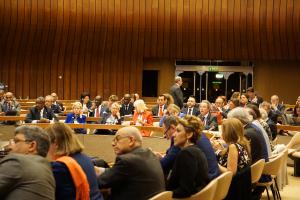La participación de no abogados en los despachos de abogados discutida en el Congreso de Oporto
Under the leadership of Commission Chair Urquiola Palacio a panel of ten attorneys from The Future of the Lawyer Commission discussed regulations in their states governing the issue of whether a non-lawyer (i.e. an individual or a corporation) may have an ownership interest in a law firm. It was noted that in all countries the legal profession strongly opposes such ownership. The fear is that to allow such ownership may place the sanctity of client confidences at risk. It was noted for example that accountants who sometimes practice separately with lawyers, do not have the privilege of confidentiality with their clients. Further, attorneys fear that non-attorney ownership in whole or in part of their law firms may adversely affect their ability to make judgments independently. Both client confidentiality and independence of judgment are core values of the legal profession.
On the other hand it was noted that in some jurisdictions attorneys and accountants already practice in the same firm and that there have not been complaints from clients or attorneys. It was also noted that in other jurisdictions some law firms are funded by private investment and that some of the investors are not attorneys. Also in other jurisdictions legal services are offered to shoppers in supermarkets and other retail establishments. And, of course, for many years large insurers have created and maintained their own law firms in which the individual attorneys are employees of the insurer.
Some of the reasons noted for allowing non-attorney investment in or ownership of law firms included the increasing need for large amounts of capital to fund the expensive technology which is essential to the efficient operation of a law firm today. Further, it was noted that by investing in technology law firms will operate more efficiently and the cost of purchasing legal services will decrease. In the end it was suggested, more people will have access to legal services including those for whom legal services are presently beyond their ability to purchase.
Fred Kan, an attorney from Hong Kong, noted the increasing presence of third party funders in litigation and expressed concern about whether that phenomenon might affect the principal attorney's independence of judgment.
In sum it was clear from all speakers that the rules governing third party, non-lawyer involvement in law firms are evolving and that further change is inevitable. "
James C. Moore
Arbitrator & Mediator






